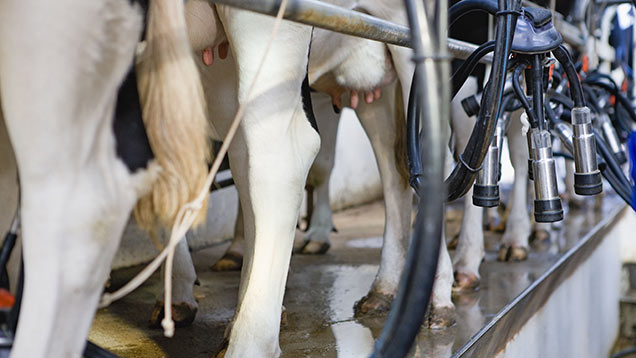Are A-B contracts fit for purpose? We ask the experts
 ©Juice/Rex
©Juice/Rex Many processors are set to revisit their milk contract pricing strategy as a result of an oversupply of milk and subsequent lower milk prices.
In recent weeks, First Milk joined a growing number of processors choosing to move their suppliers onto A-B contracts. Their aim is to match milk production with market requirements and processing capacity.
A-B contracts pay an amount for a set number of “A” litres, usually based on an individual farm’s 12-month average production. Depending on the processor, an A price could be paid for say 85-100% of production. Any production over this is then paid at a “B” rate, which is usually based on spot price.
This type of contract should not affect average producers too much, but could offer a blow to those who have expanded recently or are spring block calvers, who will produce more litres at price B when spot price is low. Changing system or processor may be relevant to these producers if possible, experts say.
Questions you should ask your milk buyer
- Can I sell my B volume elsewhere?
- Will my processor offer any extra A litres to existing producers first?
- What will happen if I underproduce A litres (perhaps due to TB or seasonal calving) – will I have to pay the difference?
- If I choose to increase cow numbers, will my processor take the extra milk as A? If not, can I sell it elsewhere?
- Will my quota have any value?
For the processor, the aim of these contracts is to reduce risk. It should also reduce costs, as they won’t need to find an outlet for excess milk in a flooded market. The question is, will the benefits be passed back to the farmer?
It’s early days, but in principle these types of contracts could equip farmers with greater flexibility, allowing them to budget and potentially sell B litres elsewhere. However, ensuring contracts are set up fairly to allow this is crucial, agree experts.
NFU national dairy board chairman Rob Harrison believes greater transparency and certainty over pricing will be crucial for A-B contracts to work.
“If farmers are giving processors a defined volume, then I think the processor should give more certainty over A pricing. Otherwise the farmer is in no different position to now, but the processor is shaving off balancing costs,” says Mr Harrison.
He also believes there is a need for greater transparency on how B pricing is calculated, as it could be easy for these prices to be manipulated.
John Allen from Kite Consulting says the pros and cons of A-B contracts will vary drastically according to buyer. “If a processor is using an A-B scheme to just get cheap milk, then it’s not a good deal for the farmer, but if the farmer is getting a premium value for A litres, then it’s fair,” he says.
Dairy farmer David Shaw believes A-B contracts offer an answer to the current milk price situation, but only when designed around a formula that benefits both the farmer and processor. He has been working with his processor, Longley Farms, to develop an A pricing model linked to cost of production.
“It benefits the processor as they’re able to get a level supply and it benefits me as I know what I’m going to get paid based on COP. That means I can budget,” says Mr Shaw, who runs 280 Jerseys at Grey Leys, Elvington.
The herd averages 5,000 litres a cow a year at 6% fat and 4% protein. Mr Shaw moved to an A-B contract about three months ago and receives an A price for 3,600 litres a day, which has been calculated on predicted production. In February, this price was 37p/litre and he had only produced 193 litres at the B price.
Mr Shaw says these types of contract provide flexibility for farmers, who can either choose not to produce B litres or sell them elsewhere. However, Mr Allen says the ability to trade milk in different ways may not be practical for many producers.
In general, he says there are also uncertainties over how A-B pricing will work when the market picks up.
“The question to ask your processor is how will this mechanism work when the B price exceeds the A price? Will the farmer get more?” Mr Allen asks.
All parties believe it is crucial farmers talk to their milk buyers to formulate a fair deal.
